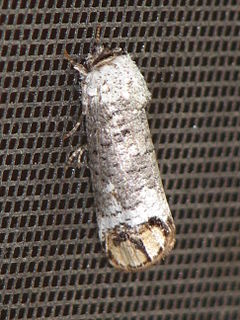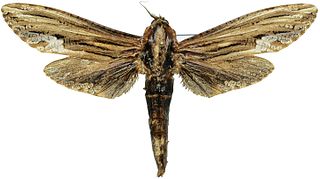Related Research Articles

The Cossidae, the cossid millers or carpenter millers, make up a family of mostly large miller moths. This family contains over 110 genera with almost 700 known species, and many more species await description. Carpenter millers are nocturnal Lepidoptera found worldwide, except the Southeast Asian subfamily Ratardinae, which is mostly active during the day.

Phragmataecia is a genus of moths belonging to the family Cossidae. Members of this genus are found throughout the world apart from North America.

Phragmataecia castaneae, the reed leopard or giant borer, is a moth of the family Cossidae. It was described by Jacob Hübner in 1790. It is found in central and southern Europe, the Middle East, the Caucasus, Transcaucasia, Turkmenistan, Kazakhstan, north-western Iran, Iraq, Syria, Sri Lanka, Madagascar, India, Lebanon, Turkey, western China, south-western Siberia, Egypt, Tunisia and Morocco.
Meharia is a genus of moths belonging to the family Cossidae.
Phragmataecia irrorata is a species of moth of the family Cossidae. It is found in Zimbabwe, South Africa, Namibia, Botswana, Mozambique, Zambia and Malawi.

Dyspessa is a genus of moths belonging to the family Cossidae. It was described by Jacob Hübner in 1820.

Acossus terebra is a species of moth of the family Cossidae. It is found in Eurasia, including Israel, Turkey, northern Spain, central and southern Europe, southern Sweden, Finland, the Baltic region, Ukraine, the central part of European Russia, the Caucasus, southern Siberia to southern Yakutia, the southern part of the Russian Far East, Korea, Heilongjiang, Jilin and inner Mongolia.
Paropta paradoxus is a species of moth of the family Cossidae. It is found on Cyprus and Rhodes and in Lebanon, Syria, Egypt, Saudi Arabia, Israel, Iran and Jordan.

Wiltshirocossus aries is a species of moth of the family Cossidae. It is found in southern Spain, on the Canary Islands, as well as in Mauritania, Israel, Saudi Arabia, Bahrain, the United Arab Emirates, Yemen, Oman, Algeria, Tunisia and Egypt. The habitat consists of deserts and semidesert areas.
Stygioides colchica is a species of moth of the family Cossidae. It is found in Bulgaria, Greece, the southern part of European Russia, Ukraine, Turkey, Armenia, Lebanon and Israel.

Xyleutes is a genus of moths belonging to the family Cossidae.
Catopta is a genus of moths in the family Cossidae.
The Metarbelidae are a family of the Cossoidea also called the carpenter or goat moths, and is sometimes treated as a subfamily, Metarbelinae of the Cossidae. No synapomorphies are shared with the Cossidae based on adult morphology. The family Metarbelidae was first described by Embrik Strand in 1909.

The Zeuzerinae are a subfamily of the family Cossidae.
Brachylia is a genus of moths in the family Cossidae.

Duomitus is a monotypic moth genus in the family Cossidae described by Arthur Gardiner Butler in 1880. Its only species, Duomitus ceramicus, described by Francis Walker in 1865, is found in Yunnan in China and from southern India and Malaysia to Sumatra, Ceram and New Guinea.
Skeletophyllon is a genus of moths in the family Cossidae.
Trismelasmos is a genus of moths in the family Cossidae.
References
| Wikispecies has information related to Phragmataecia sumatrensis |
| Wikimedia Commons has media related to Phragmataecia sumatrensis . |
| This article relating to the moth subfamily Zeuzerinae is a stub. You can help Wikipedia by expanding it. |